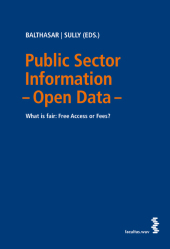 Neuerscheinungen 2014Stand: 2020-02-01 |
Schnellsuche
ISBN/Stichwort/Autor
|
Herderstraße 10
10625 Berlin
Tel.: 030 315 714 16
Fax 030 315 714 14
info@buchspektrum.de |

Alexander Balthasar, Melanie Sully
(Beteiligte)
Public Sector Information Open Data
What is fair: Free Access or Fees?
Herausgegeben von Balthasar, Alexander; Sully, Melanie
2014. 118 S. 230 mm
Verlag/Jahr: FACULTAS 2014
ISBN: 3-7089-1196-2 (3708911962)
Neue ISBN: 978-3-7089-1196-0 (9783708911960)
Preis und Lieferzeit: Bitte klicken
The original Directive 2003/98/EC on the re-use of public sector information aimed to promote and encourage the re-use of documents held by public bodies (recital 9). One the one hand, this information was considered to be an important primary material for digital content products and services (recital 5) and, thus, put into an economic/commercial context. On the other hand, when it comes to compliance with fundamental rights, reference was made (in recital 9) not to Article 16 (freedom to conduct a business), but to Articles 41 (right to good administration) and Article 42 (right of access to documents) of the EU Charter of Fundamental Rights which implement the values of democracy and of the rule of law in the context of citizens rights . Pursuant to the General Principle set out in Article 3, the same legal framework shall apply for the re-use of public sector information, the purpose of the private actor be commercial or non-commercial . Given, however, the crucial differences between these two sectors: isn t it, under the principle of equal treatment (Article 20 EUCFR), highly problematic to treat these two different situations in the same way? The amending Directive 2013/37/EU seems even to aggravate concerns: on the one hand, the main principle governing charging shall be that these charges be limited to marginal costs , whereas the original Article 6 allowed a reasonable return of investment to the public body. On the other hand, Member States may avoid this regime altogether by simply opting completely out (Article 1 (3), also amended version; cf also CJEU Judgment of 12 July 2012, C-138/11 [Compass v. Austria], point 50) a result contrary to the aim of Article 114 TFEU (the legal basis of the Directive and its amendment) to harmonize national legislation. Against this background, it seemed appropriate to ponder from different perspectives (public bodies, industrial stakeholders, academia) on the question which system of access does fit best for which category of public data/for which private purpose, serving alike the interest of public property as well as that of macroeconomics as well as that of enhancing the internal market of the European Union? In this volume a representative sample of the contributions made at a workshop held on 25 June 2013 in Vienna on that issue are assembled.
Alexander Balthasar, Head of the Institute for State Organisation and Administrative Reform, Federal Chancellery of Austria; Privatdozent for Constitutional Law and General Political Theory at the Karl-Franzens-Universität Graz Melanie Sully, Head of the Institute for Go-Governance (Vienna); former professor for Political Science at the Diplomatic Academy (Vienna)


